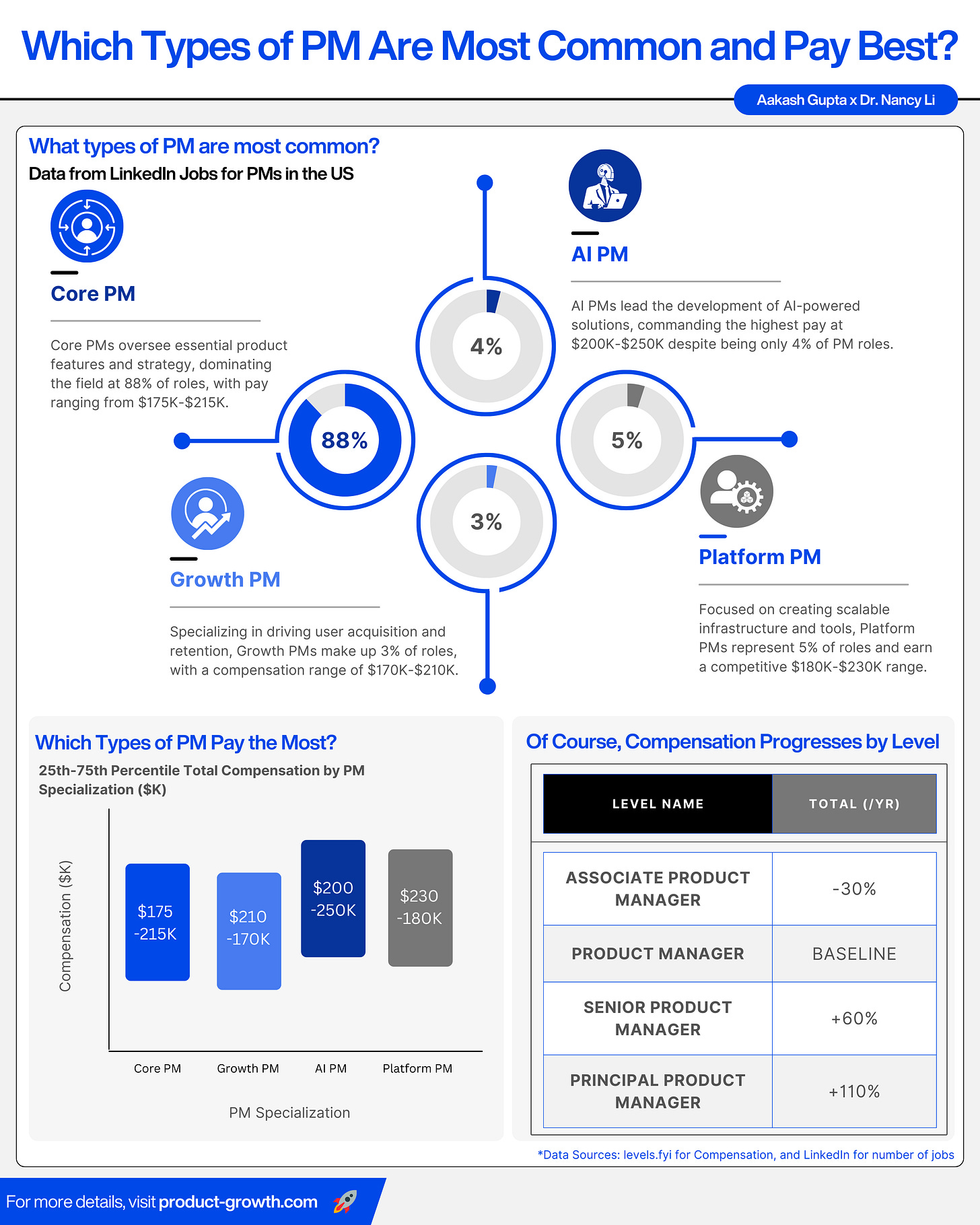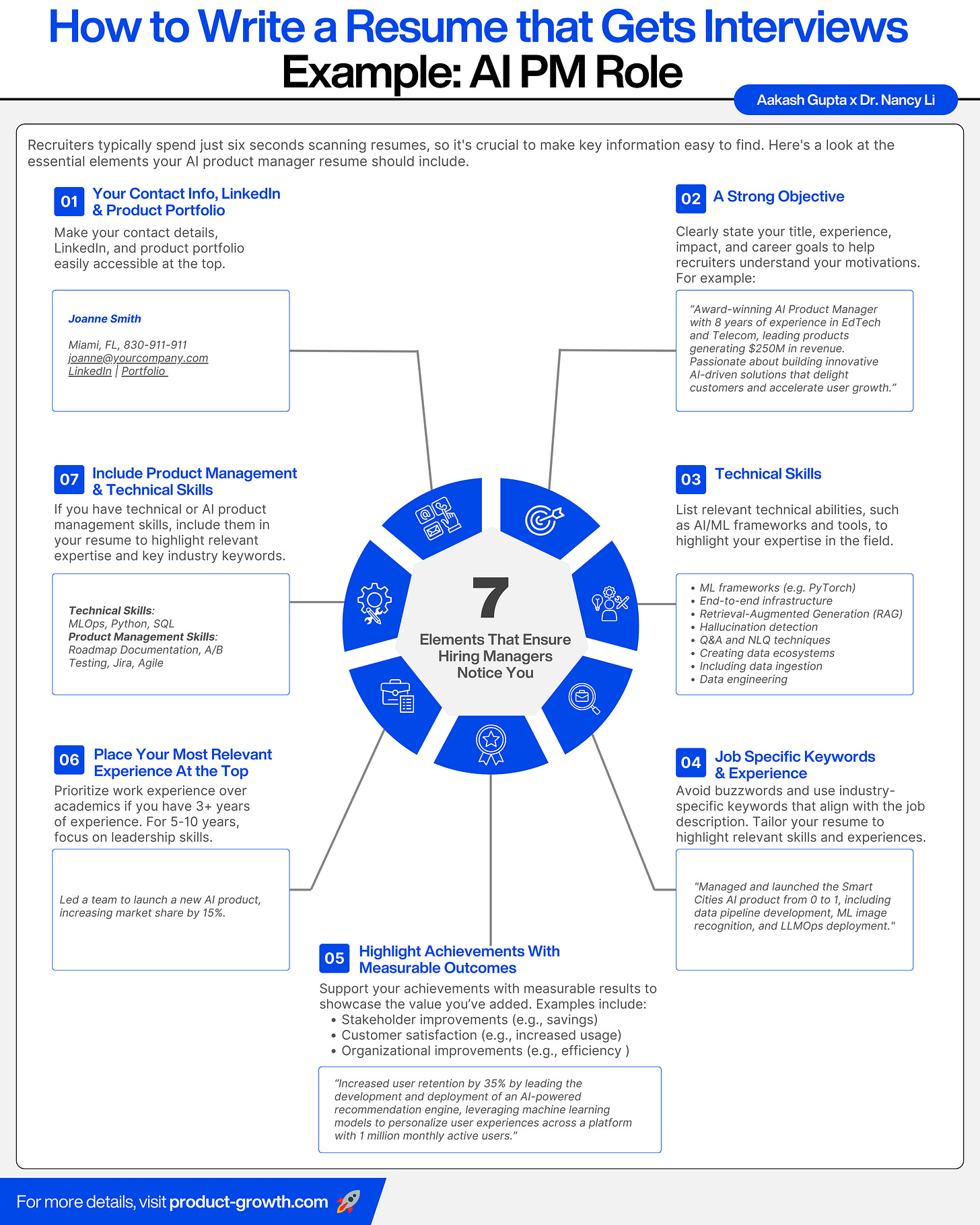How to Write a Killer AI Product Manager Resume (With Examples)
Applying for hundreds of AI product manager roles, but getting nowhere? It might be your resume. Here's how to do it right and win those job offers.
AI PM is the fastest growing segment of PM, that’s already surpassed Growth PM, and pays the best as well.
But people are really struggling to get jobs in this segment.
With companies at the top of the market, like Netflix, offering upwards of $900k per year for AI product managers, it’s not hard to see why competition is so fierce.
So how do you actually create a resume that will get you in the door for these roles?
Re-Introducing Dr. Nancy Li
Dr Nancy Li is a former Director of Product who has a great YouTube channel and runs the PM Accelerator, coaching over 1000+ PMs landing AI PM jobs.
We collaborated on How to Become an AI PM with No Experience and you all loved that piece. So - we’re back.
Today’s Post
We’re going to give you a step-by-step guide on how to create a winning AI product manager (PM) resume:
The 7 Elements That Ensure Hiring Managers Notice You
Your AI PM Resume Template to Succeed
How to Win Over ATS Systems
Most Common Mistakes
The Most Important Thing:
How to Gain and Frame Real-World Experience Without Having It
1. The 7 Elements That Ensure Hiring Managers Notice You
After reviewing thousands of resumes and working with numerous successful AI PMs…
We can tell you that these 7 elements make the difference between a resume that lands in the "maybe" pile and one that triggers an immediate interview request:
Element #1 - Your Contact Info, LinkedIn and Product Portfolio
Your contact section isn’t just a formality—it’s the first interaction a recruiter has with your professional brand.
A polished, easy-to-read header sets the tone for the rest of your resume.
Best Practices:
Use a clean layout: Name, city, email, phone, LinkedIn, and portfolio links. Example: Joanne Smith | Miami, FL | (830) 911-9111 | joanne@yourdomain.com | LinkedIn | Portfolio
If your LinkedIn isn’t optimized, fix it before applying. Key updates:
Add a concise, results-focused summary.
Ensure your headline matches the role (e.g., "AI Product Manager | Driving ML-Driven Solutions at Scale").
Highlight relevant AI projects in the "Featured" section.
Portfolios are gold. Even a simple one-pager showcasing an AI project prototype or roadmap demonstrates hands-on expertise.
Your LinkedIn and portfolio are extensions of your resume. Recruiters often review them before scheduling an interview. If they’re messy, outdated, or irrelevant, you risk losing momentum even if your resume passes the first round.
You can also consider getting creative. Last week, Aakash worked with Sarah, a talented PM transitioning to AI. Her initial resume listed basic contact details, but we transformed it into a powerful introduction:
Before:
Sarah Johnson sjohnson@email.com (555) 555-5555After:
Sarah Johnson
Miami, FL | (830) 911-9111 | joanne@yourcompany.com | LinkedIn | Portfolio | GitHub | Medium (12K followers, AI focus)This immediately establishes Sarah as an AI thought leader and gives hiring managers multiple channels to learn more about her work.
The GitHub link shows technical credibility, while the Medium following demonstrates industry influence.
Element #2 - A Strong Objective
Your objective statement isn't just a summary – it's your elevator pitch.
In the AI PM world, it needs to thread three critical needles: technical credibility, business impact, and vision for AI's future.
Here are two real examples from successful AI PM resumes:
Weak Example:
"Experienced product manager seeking an AI role to leverage my skills and drive innovation."Strong Example:
"Product leader with 5+ years of experience scaling ML products from 0 to 1M users. Led development of production LLM applications reducing customer service costs by 65% at Salesforce. Passionate about building ethical AI systems that augment human capabilities while maintaining transparency and trust."The difference? The strong example demonstrates:
Specific experience with ML products
Quantifiable business impact
Technical understanding (LLMs)
Vision and values (ethical AI, transparency)
These 4 steps can get you to something similar:
Start with your current identity (AI PM, ML Product Leader, etc.)
Add your most impressive quantifiable achievement
Mention specific AI technologies you've worked with
Close with your vision for AI's impact
Element #3 - Technical Skills
AI Product Managers sit at the intersection of strategy and technology.
Your ability to talk the talk with engineers and data scientists is critical.
Even if you don’t code, you must understand how AI products are built, deployed, and iterated on.
You want to highlight things like:
AI Frameworks and Tools: PyTorch, TensorFlow, SageMaker.
AI Concepts: LLM fine-tuning, prompt engineering, hallucination detection, data pipelines.
Relevant Infrastructure: Vector databases, end-to-end ML workflows, cloud platforms (AWS, Azure).
One way to present this is with a skills section.
But the more important use is to integrate these skills into your achievements rather than listing them.
For example:
Instead of:
"Familiar with TensorFlow and SageMaker."Write:
"Deployed personalized product recommendations using TensorFlow models on AWS SageMaker, increasing conversion rates by 22%."
This stands out because it connects technical expertise with business impact, which is exactly what AI PMs are hired to do.
Element #4 - Job Specific Keywords & Experience
More than half of resumes we encounter include fluffy content that’s filled with buzzwords, cliches and irrelevant information.
Words like ‘passionate’ and ‘spearheaded’ are overused and are likely to lead the recruiter to move on to someone else.
It’s important to use industry-specific keywords that are relevant to the role you’re applying for.
You do this by thinking of a universal principle: focus on the parts of your previous roles that are relevant to your future job.
For example:
Let’s look at this AI Product Manager job at Netflix: Product Manager, AI Platform ($240K- $725K annual salary).
They are looking for:
Having led the vision and strategy for our model consumption layer, conversational assistants, LLMOps, prompt management, prototyping tools, and an opinionated app development framework for AI applications and agents.
8+ years of experience as a Technical Product Manager with at least 2+ years of domain experience in ML/AI consumer scale AI platforms.
A proven track record of managing and evolving a product portfolio and/or driving product vision and strategy
Your resume should reflect the key skills they are looking for in this specific role.
So, for example, include something like this:
End-2-end AI product life cycle: managed and launched the Smart Cities AI product from 0 to 1 including data pipeline development, ML image recognition model training, prompt management, LLM model fine-tuning, LLMOps, and AI agents
What’s also very important to note is: any experience you add to your resume needs to have been gained through real-life hands-on AI product management.
You shouldn’t simply list theoretical concepts on your resume that aren’t backed by work you’ve actually done.
On that point of work you’ve actually done - Nancy is holding an AI PM workshop on 11 December (register here for free) during which she’ll be going over the framework used by students in her AI PM Bootcamp, after which they 100s have landed AI PM Jobs. Students are guided to build real AI products, as Aakash advises.
This kind of experience truly is needed in this fierce market.
We’ve seen it time and time again with mentees.
It gives you something tangible that you can confidently include on your resume.
Element #5 - Highlight Achievements With Measurable Outcomes
Keep reading with a 7-day free trial
Subscribe to Product Growth to keep reading this post and get 7 days of free access to the full post archives.




